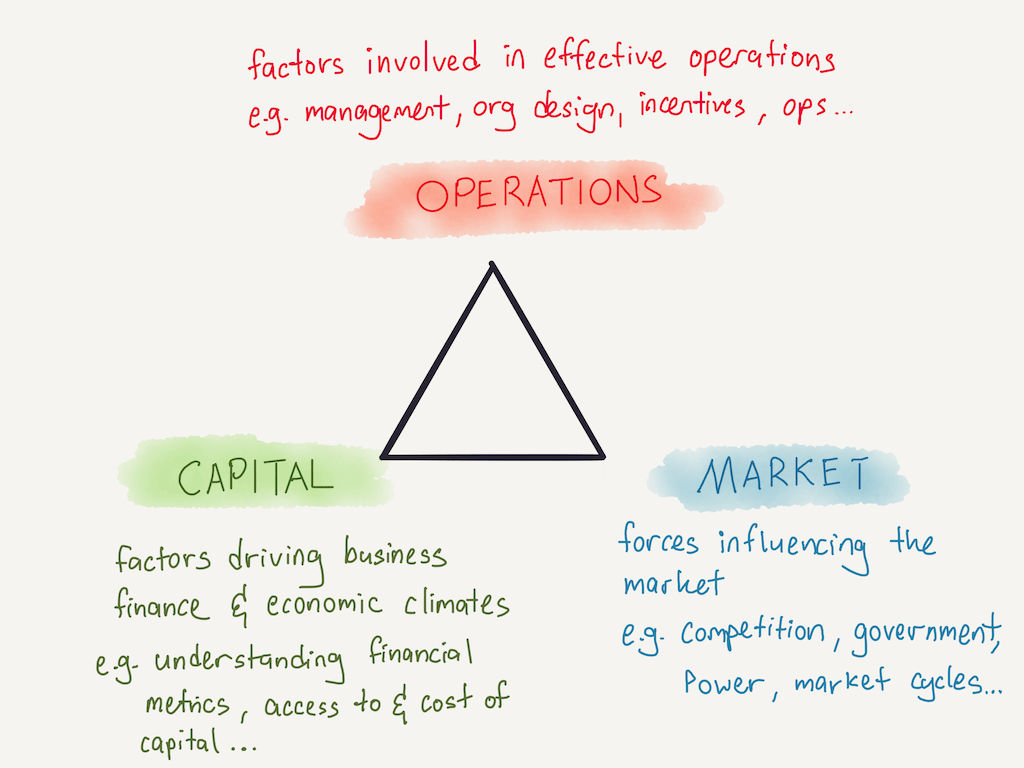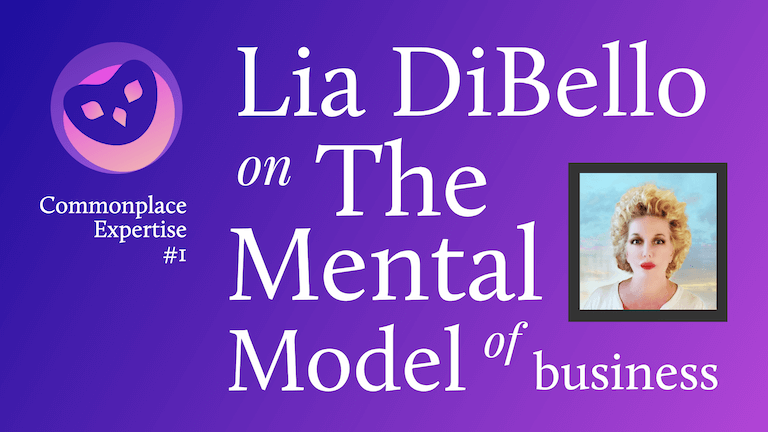What if you could reach into the heads of great businesspeople and pluck out the superstructure of their expertise? Commoncog has a unique approach to the study of business. This is that approach.
In the late 1980s, the US Military began funding a branch of psychology called ‘Naturalistic Decision Making’ (NDM). This field of research studied decision making by experts in real world environments, often by embedding researchers with the practitioner in the full mess of their domain. In the beginning, NDM focused on domains of interest to the military: soldiers, pilots, navy sailors, firefighters, policemen and surgeons.
The field eventually developed a handful of methods to extract models of expertise that was stuck in the heads of experts. It used these methods to design accelerated expertise training programs, to unreasonable success. In 2008, the US Air Force Research Laboratory and the US Department of Defence requested a full report on such accelerated training methods; this was eventually published by a subset of the researchers as the book Accelerated Expertise.
In 2010, one of these NDM researchers began studying the expertise of business.
Lia DiBello grew up in a business family, before starting her career in academia. She wanted to see what would fall out if NDM’s expertise elicitation methods were used with expert businesspeople. Her original study was funded by a National Science Foundation grant.
DiBello discovered something remarkable: every great business person shares the same tacit mental model of business. In other words, they think about business in exactly the same way. DiBello’s first result was an assessment that evaluated the expertise of businesspeople in the field, and predicted their subsequent performance in the market.
The methods and publications that make up her body of work are examined in detail in the Business Expertise Series. (That series was initially members-only, but is now released for free to all Commoncog readers).
DiBello’s work has been a huge influence on this site. Nearly all of Commoncog’s essays on business may be organised according to the mental model of business expertise that she uncovered, and her ideas may be used as a ‘syllabus’ if you want to get good at business. This topic overview gives you a high-level summary of DiBello’s ideas, and explains how her model is connected to the organisation of Commoncog’s articles.
At the core of DiBello’s work lies two things:
- A ‘triad’ mental model of business that consists of three components. This triad makes up a large chunk of business expertise — different industry verticals might have different instantiations of the triad, but the core structure of this mental model is present in every business.
- A mental attribute DiBello calls ‘cognitive agility’, which is the ability to update one’s mental models quickly when presented with disconfirming evidence.
We’ll take a quick look at both ideas.
The Triad
DiBello writes that experts in business are people who have achieved a deep understanding of the following core areas of their business:
- Factors involved in effective Operations (which DiBello calls ‘Supply’) — this is the most obvious of the three legs in the triad; good businesspeople have a firm grasp of the operational nature of their firm. (Or, if they do not themselves have such a firm grasp, they have someone in their executive team who does).
- Factors influencing the Market (which DiBello calls ‘Demand’) — this is the second most obvious of the three legs in the triad; good businesspeople have an intuitive sense of their market, understand their competitive position within it versus other competitors, and grok the factors that influence new entrants or competitive threats.
- Factors driving business finance and economic climates (which DiBello calls ‘Capital’) — this is the least obvious of the three legs. Talk to a novice business observer and they would tell you that businesspeople are good at running their own businesses (Operations) and are good at reading their competitive environment (Market). But it is less obvious that a deep understanding of capital is also part of business expertise. DiBello argues that expert businesspeople understand the capital cycle in their industries, know how to raise money to fuel expansion, and have a deep, felt sense of cash flow, unit economics, and risk when using debt or when funding corporate activities such as mergers & acquisitions.
More importantly, DiBello writes that business experts are defined by their ability to understand how changes in each leg of this Operations-Market-Capital triad affect the other legs of the triad for their respective businesses. For instance, a change in the capital cycle for your industry (i.e. capital is harder to raise or to borrow) might result in a change in the competitive environment (certain competitors pull back in your market), which means that you may expand sales (which in turn requires some internal resource re-allocation or perhaps even a reorg) to take advantage of this opportunity. By contrast, intermediate level businesspeople tend to be very talented in only one or two of these areas, and they ‘do not understand the dynamics between these areas as well as the “superstars” do.’
Given this interrelationship between the three factors, you may visualise business expertise as a triad:

DiBello further writes that “experts in the same domain easily identify each other. Even if they don’t agree with another expert’s choices, they easily recognise that they share a common perceptual experience within their area of expertise.” This is a fancier way of saying that if a yoghurt magnate meets a mining tsar, the yoghurt businessperson might not understand the mining business, but would recognise the latter’s expertise through the facility with which they are able to reason about the Operations, Market, and Capital aspects of their business. And the yoghurt magnate would be able to do so because they have the same intuitive sense of the yoghurt business in their heads.
Conversely, expert businesspeople are able to tell when individuals are not that great at business — even if they aren’t able to articulate how exactly they know so. This, too, falls out of their perceptual experience.
Don’t Miss: 📚 Commoncog’s Top Book Summaries
- Accelerated Expertise — the best book we have on expertise acceleration methods, commissioned by the military.
- Working Backwards — for the first time, a detailed explanation of how Amazon is able to do what they do.
- Range — a mediocre book arguing for generalists over specialists: why you should read this summary, skip the book, and subscribe to the author’s newsletter instead.
Cognitive Agility
It is not enough to have a firm grasp of all three aspects of business. DiBello notes that to do well in business over the long term, you need the ability to update your mental models when presented with disconfirming evidence. Commoncog has written sparingly about this topic, mostly because there isn’t that much to say.
This aspect of business expertise is captured in the following articles:
- Business Expertise: The Importance of Cognitive Agility (this was part of the original series of posts that expanded on DiBello’s work).
- Dismissively Stubborn — an attempt to articulate the opposite of a cognitively agile person (years before covering DiBello’s work).
- Changing My Mind on Capital (members only) — an inside look at changing my beliefs on the use of external capital in business.
Using the Triad
The triad is useful in a number of ways.
First, you may take any business biography and decompose it into the three legs of the triad. As an example, Danny Meyer’s Expertise (members only) takes American restauranteur Danny Meyer’s autobiography and draws out the elements of Operations, Market and Capital present in his story. You should give this a go the next time you read a business biography. Ask yourself: what aspects of Operations, Market and Capital are present in this particular business? And what aspects of the entrepreneur’s expertise may be decomposed into the triad?
The second use for the triad is obvious: you may look at your own experiences in business and ask:
- How good are you at all three aspects of your business? And:
- How good are you at predicting how changes in one leg of the triad affect the other two legs?
Note that execution in business is usually a team affair. DiBello notes that business expertise may be regarded as a form of ‘distributed cognition’ — which is a more complicated way of saying that it is ok if you aren’t good at all three legs of the triad, so long as other members of your team shore up your deficiencies. If the triad is covered adequately by an entire team, you’re good to go.
Site Organisation
Business articles in Commoncog can broadly be divided into Operations, Market and Capital.
Operations→
Articles related to running your business better. This broadly covers org design, better management, operational rigour, becoming data driven and related topics.
Market→
Articles related to strategy, understanding your customers, and beating the competition.
Capital→
Articles related to capital structure, cash flow, unit economics and other financial nonsense.
Before diving into each of these topic clusters, you should probably first read the original series that introduced DiBello’s ideas.
Alternatively, you may enjoy listening to this podcast with Lia DiBello:

Continue Reading: 👓 Commoncog’s Best Series
- The Business Expertise Series — All the best businesspeople share a common mental model of business. This is what we know of that model, and why it works.
- The Tacit Knowledge Series — How do you extract expertise from the heads of experts?
- Becoming Data Driven in Business — The data literacy course you never had.
- The Expertise of Capital in Business — What does the expertise of capital in business look like?
This topic overview was last updated .
